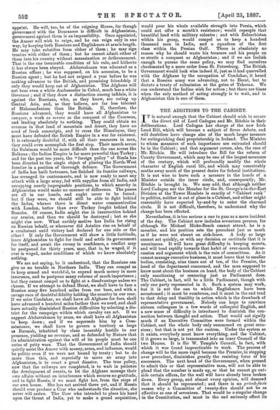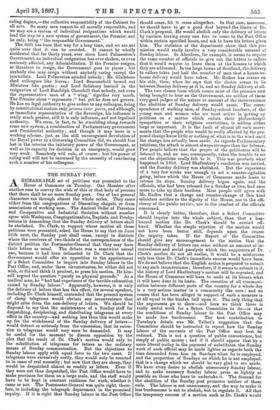THE ADDITIONS TO THE CABINET.
IT is natural enough that the Cabinet should wish to secure the direct aid of Lord Cadogan and Mr. Ritchie in their deliberations. Lord Cadogan has charge of the new Irish Land Bill, which will become a subject of fierce debate, and will doubtless have charge also of the much larger measure for extinguishing dual proprietorship in Ireland. The Minister to whom measures of such importance are entrusted should be in the Cabinet ; and that argument covers, also, the case of Mr. Ritchie. He will introduce the Bill for the reform of County Government, which may be one of the largest measures of the century, which will profoundly modify the whole character of English rural life, and which may conceivably soothe away much of the present desire for federal institutions. It is not wise to leave such a measure in the hands of a Minister outside the inner circle, and, consequently, Mr. Ritchie is brought in. We may add, that although neither Lord Cadogan nor the Member for the St. George's-in-the-East Division of the Tower Hamlets is exactly of "Cabinet rank" in politics, neither is out of place in a Cabinet, and either might reasonably have expected by-and-by to enter the charmed circle. It is not difficult, therefore, to understand why the change has been effected.
Nevertheless, it is too serious a one to pass as a mere incident of the day. The Cabinet now includes seventeen persons, for although Sir Michael Hicks-Beach cannot attend, he is a member, and his position seta the precedent just as much as if he were not absent on sick-leave. A body so large cannot act quickly, or with any decision or certitude that it is unanimous. It will have great difficulty in keeping secrets, and will tend rapidly towards that habit of over-much discus- mission and argument which is the ruin of committees. As it cannot manage executive business, it must leave that to smaller bodies, consisting, nine times out of ten, of the Premier, the head of the department concerned, and the man supposed to know most about the business on hand, the body of the Cabinet only sanctioning or censuring just as Parliament does. The Cabinet, in fact, will be a little Parliament, though with only one party represented in it. Such a system may work, but it is not the one to which Englishmen have been accustomed ; it must be cumbrous, and it must in the end tend to that delay and timidity in action which is the drawback of representative government. Nobody can hope to convince sixteen colleagues in a few words of colloquial English, and a new sense of difficulty is introduced to diminish the con- nection between thought and action. That would not signify much if an Executive Committee were formed within the Cabinet, and the whole body only summoned on great occa- sions; but that is not yet the custom. Under the system as it exists, everybody must know everything, and the Cabinet, if it grows so large, is transmuted into an inner Council of the two Houses. It is Sir W. Temple's Council, in fact, with which it was found impracticable to work. The process of change will be the more rapid because the Premier, in stepping over precedent, diminishes greatly the resisting force of his successors. The next head of the Government, when pressed to admit this or that representative man, will not be able to plead that the number is made up, or that he cannot go out- side certain offices, for the wall will have already been broken down. Every group, and almost every opinion, will demand that it should be represented ; and there is no priced-facie reason why a Committee of twenty-five should not be as effective as one of seventeen. That would be a singular change in the Constitution, and must in the end seriously affect its ruling dogma,—the collective responsibility of the Cabinet for all acts. So many men cannot be all morally responsible, and we may see a system of individual resignations which would lead the way to a new system of government, the Premier, and he only, being "the responsible Government." The drift has been that way for a long time, and we are not quite sure that it can be avoided. It cannot be wholly accidental that for thirty years, ever since Lord. Palmerston's Government, no individual resignation has ever shaken, or even seriously affected, any Administration. If the Premier resigns, or threatens to resign, the Government goes to pieces ; but anybody else may resign without anybody caring except the journalists. Lord Palmerston minded nobody ; Mr. Gladstone shed colleagues like leaves ; Lord Beaconsfield bowed out • Ministers like guests ; and Lord Salisbury learned in the resignation of Lord Randolph Churchill that nobody, not even the representative man of a "wing," signifies very much. The Premier alone "represents ;" but yet he does not govern. He has no legal authority to give orders to any colleague, being by constitutional custom only primus inter pares, and although, as immediate representative of the Sovereign, his influence is really much greater, still it is only influence, and not legalised authority. We seem, in fact, to be stumbling along towards some new system, a combination of Parliamentary government and Presidential authority ; and though it may issue in a working scheme, just as the still unrecognised devolution of the Royal power to a Governing Committee did, we should fear lest in the interim the initiatory power of the Government, as well as its capacity for decision in an emergency, would grow very weak. Somebody will rule, of course ; but his power of ruling well will not be increased by the necessity of convincing such a number of his colleagues.



































 Previous page
Previous page